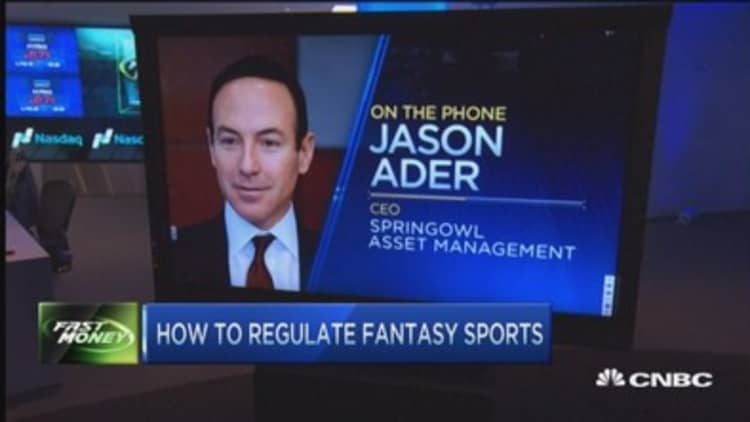The New York attorney general began an inquiry Tuesday into the prospect that employees of daily fantasy football sites have won lucrative payouts based on inside information not available to the public, asking two leading companies, DraftKings and FanDuel, for a range of internal data and details on how they prevent fraud.
Word of the inquiry came as the revelation that DraftKings and FanDuel allowed their employees – many with information not available to customers – to play at each other's sites for large amounts of money continued to rattle the sports world.
Some of the industry's primary sponsors raised questions or distanced themselves from lucrative advertising and sponsorship deals. On Monday, both companies told The New York Times that they had temporarily prohibited their employees from playing in money games.
Major League Baseball, which owns a stake in DraftKings and has a sponsorship deal with it, said in a statement that it had a policy that "prohibits its own players and employees from participating in fantasy baseball games where money or something of value is at stake, and did not know that the situation was different at DraftKings."

"We have reached out and discussed this matter with them," it said.
ESPN reduced its association with DraftKings as well. On the network's "Outside The Lines" show, the host, Bob Ley, announced that while the network will continue to air regular advertisements for the daily fantasy sites, it will no longer run individual segments sponsored by the sites.
The N.F.L., which recently struck a three-year deal with DraftKings to become a partner of the league's International Series in Britain, declined to comment.
The attorney general's move may shed light on the inner workings of the sites, which charge a fee and allow participants to build rosters of hypothetical teams and score points against hundreds of competitors based on the actual performance of players. The sites say payouts can reach $2 million.
In a letter to both companies, Attorney General Eric T. Schneiderman demanded the names, job titles and descriptions of any employees who aggregate and compile a wide range of data that perhaps could be used to gain a personal advantage — including ownership percentages and pricing algorithms. Mr. Schneiderman also demanded that the companies turn over details of any internal investigations into their employees, including the one at the center of the current scandal, Ethan Haskell of DraftKings.
It was Haskell who admitted last week to inadvertently releasing data before the lineups of all N.F.L. games were locked in for the third week of the season in late September. That same weekend, Mr. Haskell, a midlevel content manager, won $350,000 at FanDuel.
The two companies said they had investigated Mr. Haskell and cleared him of wrongdoing.
More from the New York Times:
A Primer on Daily Fantasy Football Sites
High-Pressure Demands Suit the Yankees' Tanaka
Scandal Erupts in Unregulated World of Fantasy Sports
"It's something we're taking a look at — fraud is fraud," Mr. Schneiderman said in a radio interview early Tuesday before the inquiry was announced. "And, consumers of any product, whether you want to buy a car, participate in fantasy football, our laws are very strong in New York and other states that you can't commit fraud."
Neither DraftKings nor FanDuel would specify how many of their employees competed and won money on other sites.
In Washington, Representative Hakeem Jeffries, Democrat of New York and a member of the House Judiciary Committee, called on the panel to examine "whether permitting a multibillion-dollar industry to police itself serves the best interests of the American people" while Senator Robert Menendez, Democrat of New Jersey, and Representative Frank Pallone Jr., Democrat of New Jersey, asked the Federal Trade Commission to implement safeguards to ensure a fair playing field for enthusiasts of the daily fantasy games.
Daily fantasy has its roots in informal fantasy games that began years ago with groups of fans playing against one another for fun over the course of a season. They assembled hypothetical teams and scored points based on how players did in actual games.
But companies such as DraftKings and FanDuel have set up online daily and weekly games based on a similar concept in which fans pay an entry fee to a website — from 25 cents to $1,000 — to play dozens if not hundreds of opponents, with prize pools that can pay $2 million to the winner. Critics have complained that the setup is hardly different from Las Vegas-style gambling that is normally banned in the sports world.
Eilers Research, which studies the industry, estimates that daily games will generate around $2.6 billion in entry fees this year and grow 41 percent annually, reaching $14.4 billion in 2020. So high are the potential financial rewards that DraftKings and FanDuel have found eager partners in professional sports teams and leagues and major media companies.
Read MoreFormer pro poker player makes a living on fantasy sports
Jerry Jones of the Dallas Cowboys and Robert K. Kraft of the New England Patriots have stakes in DraftKings, which recently struck a three-year deal with the N.F.L. to become a partner of the league's International Series in Britain, where sports betting is legal. In addition, DraftKings has tapped hundreds of millions of dollars from Fox Sports, and FanDuel has raised similar amounts from investors like Comcast, NBC and KKR.
Between the tens of millions of dollars in television advertising blitzing the airways and the potential for abuse in an unregulated industry, lawmakers now seem willing to examine whether daily fantasy games are pushing the boundaries of an exemption in a 2006 federal law that has allowed them to operate. The law prohibited games like online poker, but permitted fantasy play, deemed games of skill and not chance, under lobbying from professional sports leagues. The games are allowed in all but five states.

